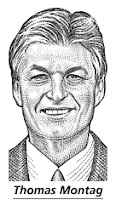The Hong Kong dollar is declining in value due to its unfortunate pegging to the US dollar, and the US dollar's extreme weakness against most other currencies. The RMB is at all time highs, thanks to its gradual, semi-moderated appreciation against a basket of foreign currencies. The RMB is still kept artificially cheap, which gives China's exports a price advantage. However, it's continued steam-letting by the central bank means a more or less guaranteed return should you buy the currency today. The RMB appreciated about 7% against the US dollar in 2007, and has gone up 4% since Jan 08. Forecasts predict it should do a total of 8-10% for FY08.
Therefore, how do YOU capitalize on this?
Buy RMB, of course. But there are a few options as to how to best do this.
Which Hong Kong bank has the best conversion rate?Usually the HK banks are pretty much even, but I've learned that some banks (Shanghai Commercial Bank) offer better rates when you have a branch manager convert for you.
Which Hong Kong bank offers the best interest rate*? Usually, local banks will offer better rates vs the global players, to attract deposits. A pretty blatant example of the variance in RMB interest rates is seen when comparing Wing Hang Bank to HSBC.
- HSBC offers a 0.5% interest rate (click here for all HSBC deposit rates) on RMB deposits of over 5,000. If you are under 5,000, you actually pay HSBC RMB50/month and get zero interest! Shanghai Commercial offers 0.70%, Wing Hang offers a 0.75% interest rate on RMB deposits over 1,000.
- For fixed RMB deposits 1-3 months, HSBC offers just 0.575%, Shanghai Commercial offers 0.80%, while Wing Hang offers 0.83%.
Which Hong Kong bank is the easiest to deal with? Local banks are more paper-based, vs. web-based HSBC. Expect worse English but fast service, vs. HSBC's millions of customers waiting at the tellers and calling up the hotlines.
Other considerationsIf you ever want to transfer RMB from one account to another, across different banks, you will have to withdraw cash to do so. There is currently no electronic transfer of RMB to RMB accounts in HK. Therefore, it's best to make the right decision upfront about which bank to stick with, or else get used to carrying wads of RMB 100 dollar bills from bank to bank, and dealing with the tellers counting and checking them one by one. Depending on the bank, they will check the condition and authenticity of the RMB with varying degrees of anality. The central bank, Bank of China apparently will not accept any bills that are torn or have any dirt/marks on Mao's face.
Shanghai Commerical Bank: Checks each bill on both sides, one with a fluorescent lamp to check for a special square-shaped stamp invisible to the naked eye. Anality rating of 5/5
Wing Hang Bank: Checks each bill on both sides, but does it expeditiously. No luminescent devices are used. Anality rating of 4/5. I had some bills rejected at Shanghai Commercial which were accepted at Wing Hang. Several dirty bills which were rejected, but then accepted after I used a wet paper towel to clean.
HSBC: Pretty loose. The bills they hand out are often soiled and torn, which causes the bills to be rejected by the other banks. Anality rating of 2/5.
Note: If you do get your bills rejected at other banks, you can still deposit them at HSBC or exchange with them for new bills.
How do you do it? You can convert up to HKD 20,000 per day to RMB. Not sure if this is per account or per person - I tend to think there is no monitoring mechanism to prevent converting 20K per account per day.
*If you really want to get both the appreciation and the interest accumulation, then visit a branch in China to open an account. Then you get a 3+% interest rate instead of this sub-1% BS. You can set up wiring from HK to China accounts. However, getting the money from China to HK is somewhat more problematic - there are caps on getting that money out, unless you withdraw bricks of cash.
"Withdrawals from (local) Chinese banks are often limited, ranging from around RMB2,500 (US$350) to RMB6,000 (US$840) per withdrawal. However, some banks allow customers to make several withdraws in one day." -
Chinese Economic Review, April 2008
For HSBC, a foreign bank, "Account holders can only withdraw US$50,000 in cash every year, with a current monthly limit of US$30,000 and an effective daily limit of US$7,900." -
Chinese Economic Review, April 2008


 Admittedly, I haven't been following the US elections closely. However, this Wall Street Journal editorial (4/21/08) sums up Obama's tax stance nicely, and presents factual backup (see graph below) that raising taxes leads to lower tax revenues, while reducing taxes leads to increased tax revenues. Below are a few of Obama's key tax policy points:
Admittedly, I haven't been following the US elections closely. However, this Wall Street Journal editorial (4/21/08) sums up Obama's tax stance nicely, and presents factual backup (see graph below) that raising taxes leads to lower tax revenues, while reducing taxes leads to increased tax revenues. Below are a few of Obama's key tax policy points:
